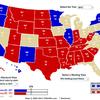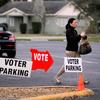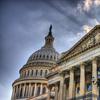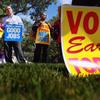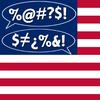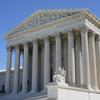Nate Persily appears in the following:
The Impacts of Redistricting on Tuesday's Election
Friday, November 09, 2012
How Voter ID Laws Could Affect the 2012 Elections
Thursday, September 13, 2012
Government Shutdown Would Cost Billions
Monday, February 21, 2011
Early Saturday morning, House Republicans, prodded by fervent Tea Party freshmen passed a bill slashing government spending by $61 billion immediately. That vote forces Republicans and Democrats into a political showdown that could boil over into a government shutdown. How could this affect you? We speak with Nate Persily, Charles Beekman Professor of Law and Political Science at Columbia University, and the author of the book "Public Opinion and Constitutional Controversy."
Tight Races Could Lead To Recounts
Monday, November 01, 2010
On Tuesday, voters will cast their ballots, bringing mid-term election season to a close. Unless, of course, some races are too close to call. Polls show that close Senate and gubernatorial races in Nevada, Illinois, Pennsylvania, Washington, Wisconsin, Alaska, Colorado, Ohio and Florida could require recounts.
It’s an anxiety-inducing thought — and could potentially leave the House and the Senate hanging in the balance while the chads (or the absentee ballots, or the broken machines) get sorted.
Takeouts: FDA Cutting Down Salt; Supreme Court On Animal Cruelty Videos
Wednesday, April 21, 2010
- NUTRITION TAKEOUT: The average American consumes about 1,200 milligrams more sodium a day than they should. Too much sodium in our diets could lead to hypertension and heart disease. To combat this, the FDA is proposing a ten year plan to cut down the amount of salt in our foods. Marion Nestle, an NYU nutritionist and author of "Safe Food: The Politics of Food Safety," has the details of the FDA's plan and tells us whether it might work.
- LEGAL TAKEOUT: The Supreme Court invalidated a federal law that banned videos depicting violence against animals, in an 8-1 decision yesterday. Columbia University law professor Nate Persily looks into why the Court ruled they way it did.
Creative Solutions for a Frustrated Nation
Friday, February 26, 2010
All week we’ve been exploring the mechanics of a broken legislative body in our series, “Frustration Nation.” We wrap up the series with a look at the solutions to government gridlock. Can we move away from filibusters? Should we rehaul our election rules? Should we get rid of the Senate altogether?
How to End Political Gridlock on Capitol Hill
Friday, February 05, 2010
"Gridlock" is a term that went from engineering jargon to everyday lingo during a transit strike in 1980. Now it's used more to describe the situation on Capitol Hill, with partisan rancor holding up major legislation. We find out how stuck Congress really is and look at new ways to break the deadlock.
Implications of the Supreme Court's Decision in 'Citizen's United'
Thursday, January 21, 2010


Today's Supreme Court's decision in Citizens United v. FEC represents the most significant campaign finance and perhaps First Amendment decision we've seen from the Court in a very long time. The decision struck down the part of the McCain/Feingold campaign finance law (BCRA) that banned corporations and unions from using their treasury funds to run candidate specific ads before a federal election. The decision treats corporations like individuals, focusing on the value of their speech as opposed to the unique identity of the corporation as speaker. Previous decisions, now overruled, had held that corporations presented a unique corruption threat to the political process: "that immense aggregations of wealth [amassed] through the corporate form" posed dangers that individual expenditures did not.
